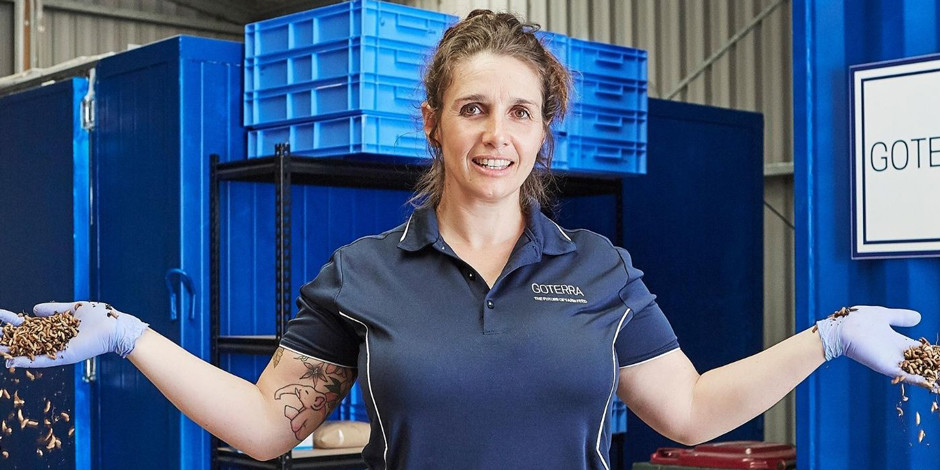Goterra and Tenacious Ventures
Olympia Yarger and her startup, Goterra is the face that launched a thousand maggots and most recently, an $8-million Series A investment.

The insect farmer is also one of the reasons Australia now has its first dedicated agrifood tech venture capital (VC) firm, Tenacious Ventures.
There aren’t many startups that can claim they changed the face of Australia’s VC sector. Olympia’s vision for a future where robot-managed insects chewed up waste, before becoming a protein-rich livestock feed was so compelling, it was one of the reasons agtech veterans Matthew Pryor and Sarah Nolet launched Tenacious Ventures in 2019, with a focus on seed and early-round investing.
“Sarah and I both saw Olympia pitch at a Rabobank FoodBytes event in 2016,” said Matthew.
“From the moment I saw her pitch, I was compelled by her as a founder. Those are the two secret ingredients we’re looking for; a unique business model insight and an exceptional founder.”
At that time, Sarah has just founded ag advisory firm, AgThentic, which Matthew would later join. Sarah mentored Olympia throughout Goterra’s seed raising round in 2018, which saw the insect farmer raise $1.2-million. Tenacious later co-led the investment for Goterra’s $8-million investment round, which was confirmed in March this year.
“If we had started Tenacious (at the time) then we absolutely would have participated in Goterra’s seed round. So, it was exciting, humbling and entirely appropriate that we got the chance to be a co-lead investor in Goterra’s Series A,” said Matthew.
“Tenacious’ job is to help deliver impact and generate market leading returns for our investors. We believe very strongly that Australia has all the right fundamentals to be a significant participant in all the innovation and business model change that will be required to get that done.
“We want to continue finding, supporting and backing exceptional founders who want to help transition our food system into a climate resilient and economically powerful system with global impact.”
Where Goterra is now and its bold plans to scale its business
Just two years ago, Goterra (the ‘got’ the last three letters of ‘maggot’, ‘terra’ standing for the company’s homebase, Canberra) was a malleable, fly shaped promise. Now, it’s a fully-fledged conviction, intent on changing the world through its decentralised biotech waste management service. It supplies restaurants, hotels, farms, supermarkets and hospitals with robot-managed capsules; inside shipping containers, black soldier fly larvae turn food waste into fertiliser.
With $8-million in its pocket, the company will now accelerate and scale, anticipating it will go from managing 10 tonnes of food waste per week, to 45,000 tonnes by 2021. It’s a perfectly circular, sustainable ecosystem; after consuming the waste, the maggots become a commodity themselves, either as feed or with pharmaceutical benefits. And this is just the beginning, with three other robots being trialled to use different insects with different outcomes, including meal worms ear tagged for human consumption.
“I’m so confident in the fact that this will continue to grow and there is going to be Goterra global,” said Olympia.
“It’s been pivotal to have people like Sarah and Matthew on this journey, as I just wouldn’t have the intestinal fortitude and internal maturation to have that thinking. It’s the buffer you need to re-negotiate the doubt.
“What I’ve always appreciated from AgThentic and Tenacious is that there’s a true sense of working partnership. You can come with your ideas, you can expect them to be challenged, but by and large you’ll be respected for making decisions that make sense.”
AgThentic and Tenacious naturally feed into each other; from insight to investment. The former offers more formal strategic advice while Tenacious still likes to be hands on in supporting a startup’s early journey, while also providing the dollars. Nearly any founder can book a 20-minute chat with the Tenacious team to talk through their challenges, and a team member will often join a startup’s board after investing.
“We refer to ourselves at Tenacious as a high conviction, high support, low volume investor,” said Matthew.
“We want to bring a lot more than money. After investing, we would expect to be talking with them on a regular basis, help provide feedback on strategy – it’s a pretty hands-on role.”
Finding the right investor means knowing who you are
“Miles Davis said, ‘Man, sometimes it takes you a long time to sound like yourself.’ I think that’s true for many founders. It takes a long time because you’re building it as you go,” said Olympia.
“I encourage people to sit down and think about what sort of company you want to be first and foremost.”
Matthew couldn’t agree more.
“The first thing we ask is where will you be in 10 years? Founders have to be really clear about what success in the future looks like,” he said. “Then you can match yourself to the right investor. You can say, this is what our ambition is, this is how we expect our investors will get a return. Sometimes that return might be financial, sometimes impact. That’s what an impact investor is; their primary interest will be seeing a social justice or environmental sustainability outcome.”
Investment has its roots in a conviction in the founder and a relationship with the team.
“Essentially a founder’s job is to sell the vision of something that doesn’t yet exist. As the investor, you’re being asked to suspend your disbelief,” Matthew says. “Getting to know the founder and their team and spending time with them is the most important part of early stage investing. You want founders who will do what they say they’re going to do.”
Both say the Australian VC scene is cautiously optimistic, despite the hits from COVID-19.
“You can’t overestimate the economic damage and that will affect everybody. On that backdrop, when it comes to startups and especially regional startups, I think there’ll be a lot of positives,” said Matthew.
“What it’s shown is that geography doesn’t matter nearly as much as we used to think that it did. Broadly, agriculture and agricultural innovation hold a lot of economic promise for recovery in Australia.
“We have these aspirations for being a significant exporter for agricultural produce, and while we’re not on track to hit the $100-billion target at the moment, a significant unlocking of that goal will be by the adoption of innovation on farm as well as becoming exporters of innovation services rather than just physical goods.”
“There’s some exciting stuff going on in the Australian VC sector right now and I think there’s so much effort towards inclusion and finding innovation where it’s not really been looked for; so looking rurally and remotely, looking for it in food and ag,” said Olympia.
“What we do well is deliver quality under extreme pressure in really difficult climatic circumstances.
“I think there are some economic difficulties coming and it will impact on investment but historically in times like the GFC, some of the best companies are formed. I don’t want adversity, but I do welcome it in that way. If it’s coming, then bring it, because when you’re complacent you just don’t push like you do when you’re hungry. You can’t stop hard things happening, but you can change the way that you respond.”
Enjoyed this story? Want to learn more about the Asia Pacific region’s innovative agrifood tech ecosystem? Sign up for our newsletter here and receive fresh stories about global leaders, farmers, startups and innovators driving collaborative change.
